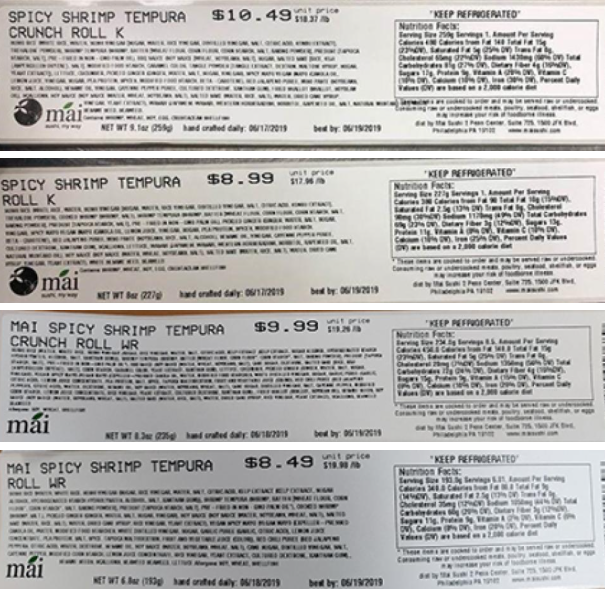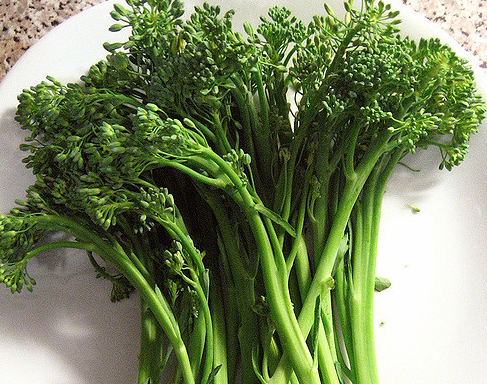According to the FDA, Genji Pacific LLC (Allentown, PA) has recalled an estimated 1490 trays of Sushi Products from Whole Foods Market Stores in the state of California after an earlier recall for Frozen Shrimp by Avanti Frozen Foods Pvt. Ltd, caused by suspected Salmonella contamination in the primary Frozen Shrimp ingredient. The products are packed in clear lid containers, with labels indicating the product name, ingredients, and best by date. The products can be identified with the Hand-Crafted date of 8/12/2021 and 8/13/2021 and Best By Date of 08/13/2021 and 08/14/2021. No illnesses have been reported to date. The recall was initiated after Avanti Frozen Foods Pvt. Ltd expanded their recall to a particular Lot of frozen shrimp received by Mai Sushi at some of our California locations. Although these products have a shelf life of 1 day, the firm is initiating this recall to ensure customer safety. @ https://www.fda.gov/safety/recalls-market-withdrawals-safety-alerts/genji-pacific-llc-alert-shrimp-sushi-rolls-relation-shrimp-recall-initiated-avanti-frozen-foods-due
ruth
8/14/2021, Genji Pacific LLC., of Allentown, PA is voluntarily recalling 1490 packs of sushi containing cocktail shrimp for products purchased in the state of California only, in relation to the Shrimp recall expansion initiated by Avanti Frozen Foods Pvt. Ltd, due to potential salmonella contaminat
ruth
The FDA reported that on 8/14/2021, Mai Cuisine Inc., of Allentown, PA, is voluntarily recalling 67 packs of 12pc Shrimp Tempura Kabuki Roll WR purchased in the state of California only. The recall relates to the Shrimp recall expansion initiated by Avanti Frozen Foods Pvt. Ltd, due to potential Salmonella contamination in frozen shrimp. The products are packed in clear lid containers. There are 12pc Shrimp Tempura Kabuki Roll. The products were sold from Mai Sushi counters inside Target stores in northern California. No illnesses have been reported to date. The recall was initiated after Avanti Frozen Foods Pvt. Ltd expanded their recall to a particular Lot of frozen shrimp received by Mai Sushi at some California locations. Although these products have a shelf life of 1 day, the firm is initiating this recall to ensure customer safety. All affected Mai Cuisine Inc. products are intended for customers to consume immediately upon purchase and have a shelf life of 1 day. However, to ensure the safety of our customers, Mai Cuisine Inc. has initiated this voluntary recall. @ https://www.fda.gov/safety/recalls-market-withdrawals-safety-alerts/mai-cuisine-inc-alert-shrimp-sushi-rolls-relation-shrimp-recall-initiated-avanti-frozen-foods-due
8/14/2021, Mai Cuisine Inc., of Allentown, PA is voluntarily recalling 67 packs of 12pc Shrimp Tempura Kabuki Roll WR purchased in the state of California only in relation to the Shrimp recall expansion initiated by Avanti Frozen Foods Pvt. Ltd, due to potential salmonella contamination in frozen sh
ruth
Hostess Brands, LLC voluntarily recalls Hostess® Soft White Hamburger Buns and Soft White Hot Dog Buns due to the product’s potential to be contaminated with Listeria monocytogenes and Salmonella. The products are being recalled out of an abundance of caution after the company became aware of this issue from its co-manufacturer, Best Harvest Bakeries, through Best Harvest Bakeries’ environmental monitoring program. To date, Hostess Brands has received no reports of illness related to this issue. The recall is limited to some lots of Hostess® Soft White Hamburger Buns and Soft White Hot Dog Buns, which were sold to distributors, convenience stores, and other retail stores throughout the United States. As Best Harvest Bakeries only manufactures some Hostess® hamburger buns and hot dog buns for Hostess Brands, no other Hostess® products are affected, including Hostess® bread and bagel products. @ https://www.businesswire.com/news/home/20210813005440/en/
ruth
The CFIA reports that it has recalled multiple batches/lots of numerous Salads and Deli Meals containing Broccoli from the Canadian marketplace due to suspected Listeria monocytogenes contamination. These Prepared Salads and Deli Meals containing Broccoli were marketed, distributed, and sold in the Canadian provinces of New Brunswick, Newfoundland and Labrador, Nova Scotia, and Prince Edward Island. There have been no reported illnesses associated with the consumption of these products.@ https://healthycanadians.gc.ca/recall-alert-rappel-avis/inspection/2021/76237r-eng.php
Industry is recalling certain broccoli-containing deli products from the marketplace due to possible Listeria monocytogenes contamination




